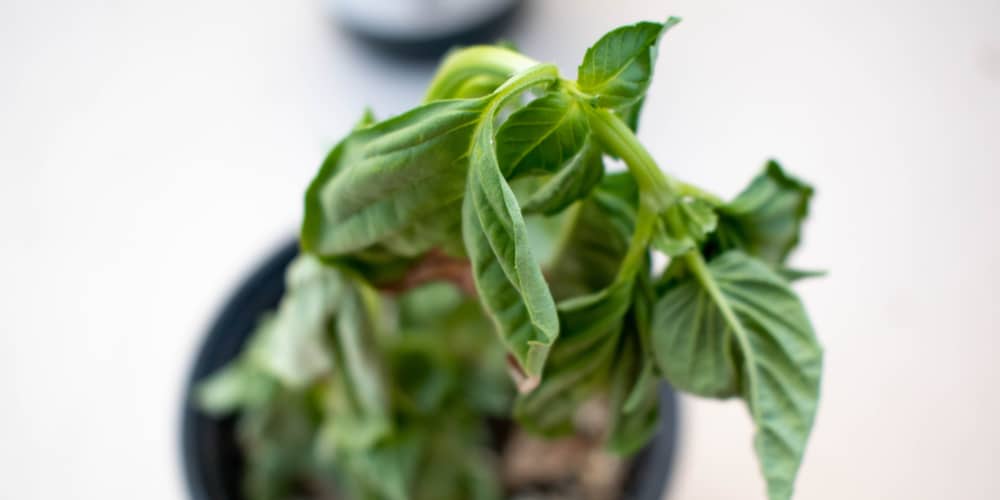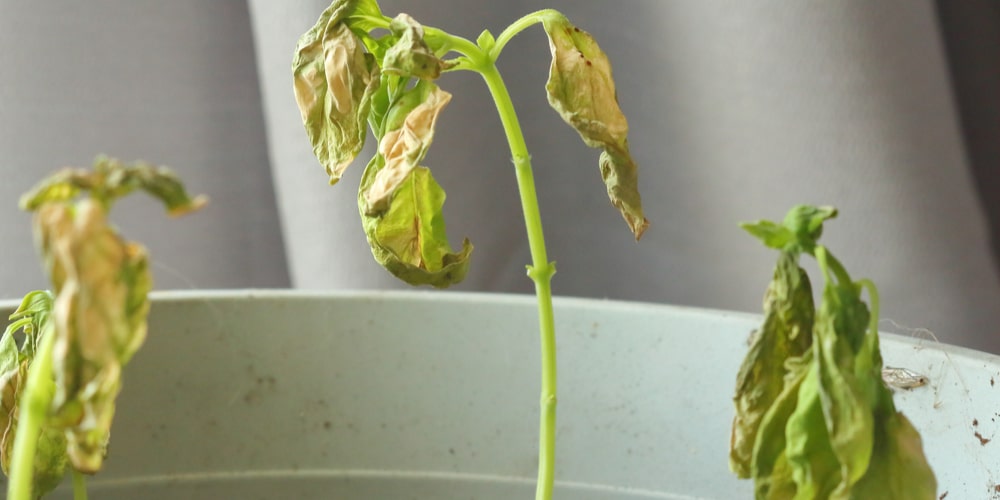Growing herbs in your garden can be fun: after all, who doesn’t like the idea of having a constant supply of spices? While it isn’t challenging, growing plants involves knowing their needs and requirements. You may be wondering what causes basil plant wilting?
One of the most popular plants among gardeners around the world is basil. This plant is native to India and does well in warm and sunny places, but it can adapt to various climates. Let’s look at why your plants wilting.
Basil Plant Wilting
Overall, under ideal conditions, basil is usually easy to grow. However, without proper care, its leaves might wilt and become droopy. If that’s something happening to you, don’t worry. It is normal and can be easily fixed if you know what to do.
Luckily, you have landed in the right place to find everything you need to know to revert your basil plant to its natural form.
Lack of Moisture
Basil loves the sun. Don’t forget to plant your herb in a location that receives adequate lighting to recreate the ideal conditions for its growth. But growing in a sunny place comes with its drawbacks, especially if you are a heavy feeder.
For instance, dry soil tends to be one of the most common causes of wilted basil. The good news is that fixing the issue should not be too complicated. Feel the soil before making any decisions: you might have to readjust your watering schedule.
Don’t forget that your plant’s watering needs will change with the weather. Usually, as the temperature rise, your basil will need more water to stay healthy.
Of course, that doesn’t mean you have to overwater your plant. Too much moisture will also be detrimental, as basil won’t stand wet feet. Such a situation might also result in wilting. If the soil doesn’t feel dry, wait for a couple of days before adding extra moisture.
Still, if you suspect lack of moisture might be the cause of your problems, consider increasing the frequency. If your basil looks sad and wilting, check how the ground looks.
Not Mulching Around Your Plants
Besides modifying the watering schedule, you might have to add a thick layer of mulch around your plants to increase water retention and improve drainage.
Use organic material for best results: bark or pine needles are excellent examples. Additionally, consider applying compost or manure: doing so will only improve the nutrient content in the soil.
Moreover, it will contribute to maintaining a stable temperature on the ground.
Don’t forget that basil should stay moist to stay healthy. If your plant has suffered from a lack of moisture, don’t worry. With the proper care, it should recover within two or three days. Consider moving your plant to the shade to aid its recovery and speed the process up.
Inadequate Soil
The type of soil you use also has a considerable impact on the overall health of your plants. Basil prefers a well-draining substrate. If you planted your herbs in pots, ensure the containers have adequate drainage holes to prevent moisture build-up that might cause fungal infections and root rot.
Additionally, don’t forget to make sure the pot’s size is suitable for your basil.
Containers that are too small might cause wilting, which results from dehydration. Indeed, a small pot will dry quicker than a large one. Plant your herbs in a container of at least 12 inches in diameter. If you can, choose terracotta or other ceramic materials over plastic or metal ones.
Lack of Pruning
Another cause of wilting might be the lack of pruning. Don’t forget that you’ll have to keep your basil in shape to maintain the plant healthy. Under ideal growing conditions, your basil might grow so fast that you’ll have to prune it around once every two weeks.
Pruning will allow adequate airflow and ensure even the leaves at the bottom of the plant get sunlight. Not cutting old leaves might result in a drooping plant.
Avoid letting your herb flower: it will cause your basil to become less productive and might cause wilting.
Don’t forget that most basil species are annuals, meaning you’ll have to replace them the following year. Regular pruning will boost production, allowing you to enjoy this herb longer.
Stress
Stress is another cause of wilting. Transplanting your herb or exposing it to sudden temperature changes might weaken the plant. After all, basil is a sensitive herb: it might suffer from temperature fluctuations.
Also, it usually requires some time to adapt to new locations. Be careful if you feel that your basil is suffering from either of these conditions.
Protect your plant from sudden changes in the temperature and don’t expect your plant to thrive as soon as you transplant it.
Basil Plant Wilting: conclusion
Taking good care of your basil plant will allow you to have a bountiful harvest.
Related Article: How Many Basil Seedlings Per Pot?

